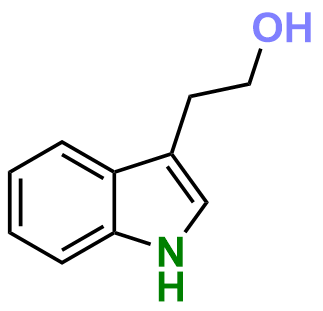Tryptophol Analysis Service
- Extensive expertise in handling various biological samples and extracting metabolites.
- State-of-the-art mass spectrometry platforms.
- Strict quality control to ensure reliable results.
- Comprehensive statistical and bioinformatics analysis.
- Personalized service to meet various research needs.
- Identification of new disease biomarkers
- Improvement of disease diagnostic procedures
- Acceleration of the discovery process for new therapeutic agents
- Gaining new insights into disease pathogenesis
- Animal tissue ≥ 100 mg
- Plant tissue ≥ 200 mg
- Serum/ Plasma ≥ 200 μL
- Urine ≥ 2 mL
Tryptophol is an aromatic alcohol with the molecular formula C₁₀H₁₁NO, consisting of an indole ring structure with an ethanol side chain attached to the 3-position. The indole ring, a bicyclic structure containing a six-membered benzene ring fused to a five-membered nitrogen-containing pyrrole ring, contributes to its aromaticity and electron-rich nature. Tryptophol is produced as a secondary metabolite during the breakdown of tryptophan, an essential amino acid, through several enzymatic pathways, including those involving the kynurenine pathway and fermentation processes. Due to its indole structure and electron-rich properties, tryptophol is found in various natural sources, including plants, fungi, and bacteria. It has been identified as having several biological activities, such as sedative, anti-inflammatory, antimicrobial, and antioxidant effects. Tryptophol is also found in several pharmaceutical compounds and has been studied for its potential therapeutic applications, particularly in neuroprotection and cancer treatment.
Changes in the levels of tryptophol and its metabolites in the body may reflect specific physiological or pathological states. Tryptophol is a key metabolite in the tryptophan metabolic pathway, and abnormal levels of tryptophol may be associated with various health conditions, including neurodegenerative diseases, sleep disorders, and metabolic syndromes. Therefore, analyzing the levels of tryptophol and its metabolites can serve as potential biomarkers for these conditions, aiding in early diagnosis, monitoring disease progression, and evaluating treatment efficacy. Tryptophol and its metabolites can also reflect levels of oxidative stress and immune response in the body. The metabolism of tryptophol can produce various bioactive compounds that interact with cellular components, potentially leading to beneficial or harmful effects depending on the context. By monitoring the levels of tryptophol and its metabolites, it is possible to assess oxidative stress and immune function, helping to develop targeted therapeutic and preventive measures.

Figure 1. The Structure of Tryptophol
MtoZ Biolabs offers an advanced Tryptophol Analysis Service. Leveraging our top-tier liquid chromatography-mass spectrometry (LC-MS) platform and a team of metabolomics experts, we deliver a comprehensive analysis of tryptophol to meet researchers' needs.
Analysis Workflow
Service Advantages
Applications
Sample Submission Requirements
1. Sample Types
Tryptophol can be analyzed from a variety of biological samples including serum, plasma, urine, and tissues. It's important to provide more than 3 samples with the same condition for each type.
2. Sample Volume
3. Sample Preservation
To maintain the stability of the samples, they should be stored at -80°C.
Note: Please provide detailed information about sample collection and handling.
Deliverables
1. Experimental Procedures
2. Relevant Liquid Chromatography and Mass Spectrometry Parameters
3. Detailed Information on Tryptophol
4. Raw Data
5. Custom Analysis Report
At MtoZ Biolabs, we are dedicated to offering you a robust Tryptophol Analysis Service to support your research and product development, delivering precise and trustworthy results. Trust MtoZ Biolabs for all your metabolomics analysis needs.
How to order?







